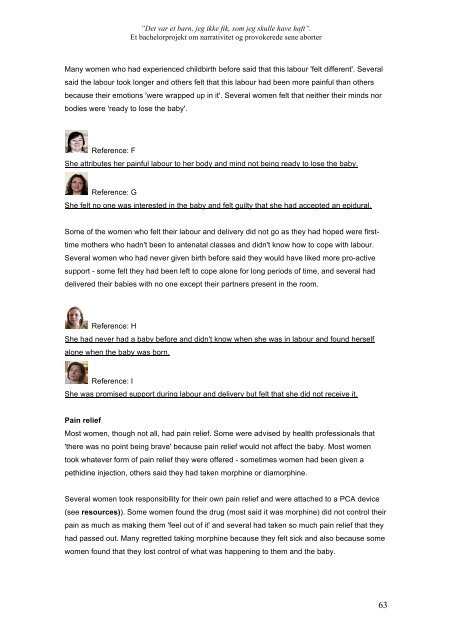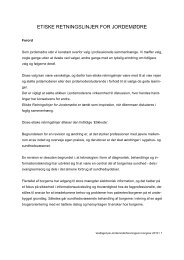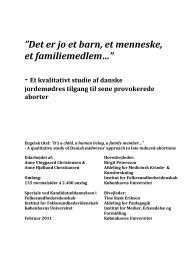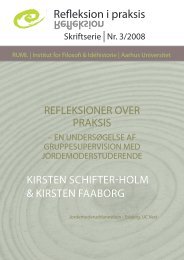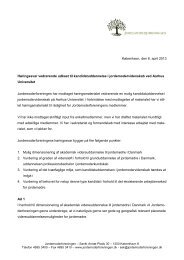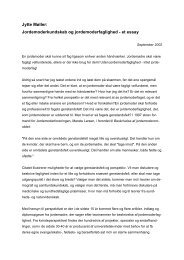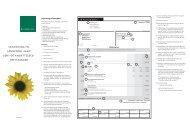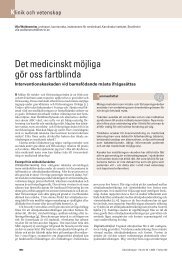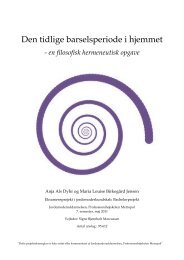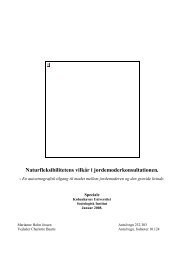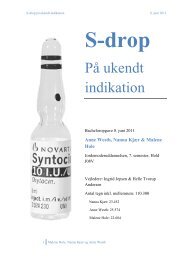“Det var et barn, jeg ikke fik, som jeg skulle have haft”
“Det var et barn, jeg ikke fik, som jeg skulle have haft”
“Det var et barn, jeg ikke fik, som jeg skulle have haft”
You also want an ePaper? Increase the reach of your titles
YUMPU automatically turns print PDFs into web optimized ePapers that Google loves.
”D<strong>et</strong> <strong>var</strong> <strong>et</strong> <strong>barn</strong>, <strong>jeg</strong> <strong>ikke</strong> <strong>fik</strong>, <strong>som</strong> <strong>jeg</strong> <strong>skulle</strong> <strong>have</strong> <strong>haft”</strong>.<br />
Et bachelorprojekt om narrativit<strong>et</strong> og provokerede sene aborter<br />
Many women who had experienced childbirth before said that this labour 'felt different'. Several<br />
said the labour took longer and others felt that this labour had been more painful than others<br />
because their emotions 'were wrapped up in it'. Several women felt that neither their minds nor<br />
bodies were 'ready to lose the baby'.<br />
Reference: F<br />
She attributes her painful labour to her body and mind not being ready to lose the baby.<br />
Reference: G<br />
She felt no one was interested in the baby and felt guilty that she had accepted an epidural.<br />
Some of the women who felt their labour and delivery did not go as they had hoped were first-<br />
time mothers who hadn't been to antenatal classes and didn't know how to cope with labour.<br />
Several women who had never given birth before said they would <strong>have</strong> liked more pro-active<br />
support - <strong>som</strong>e felt they had been left to cope alone for long periods of time, and several had<br />
delivered their babies with no one except their partners present in the room.<br />
Reference: H<br />
She had never had a baby before and didn't know when she was in labour and found herself<br />
alone when the baby was born.<br />
Reference: I<br />
She was promised support during labour and delivery but felt that she did not receive it.<br />
Pain relief<br />
Most women, though not all, had pain relief. Some were advised by health professionals that<br />
'there was no point being brave' because pain relief would not affect the baby. Most women<br />
took whatever form of pain relief they were offered - <strong>som</strong><strong>et</strong>imes women had been given a<br />
p<strong>et</strong>hidine injection, others said they had taken morphine or diamorphine.<br />
Several women took responsibility for their own pain relief and were attached to a PCA device<br />
(see resources)). Some women found the drug (most said it was morphine) did not control their<br />
pain as much as making them 'feel out of it' and several had taken so much pain relief that they<br />
had passed out. Many regr<strong>et</strong>ted taking morphine because they felt sick and also because <strong>som</strong>e<br />
women found that they lost control of what was happening to them and the baby.<br />
63


